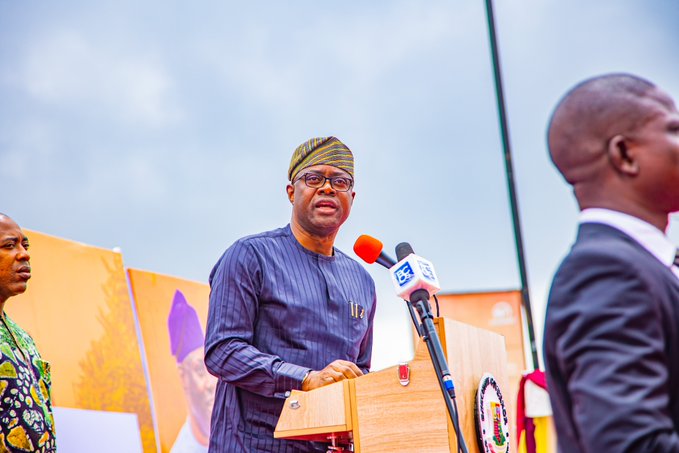Oyo State Governor, Seyi Makinde, has defended his position on the controversial tax reform bills proposed by the President Bola Tinubu-led government.
The governor made his comments during a media chat at the Broadcasting Corporation of Oyo State (BCOS) in Ibadan. This came after he and other members of the National Economic Council (NEC) had been criticised for opposing the tax bills.
Makinde clarified that he was not against the tax reforms themselves but believed that a broader consultation with stakeholders was essential before proceeding further.
“I am not against the tax bills,” Makinde said during the weekend interview. “What I am against is the lack of adequate consultation before the bills reached the National Assembly. Tax reforms are important, but they must involve a broader dialogue with Nigerians.”
He explained that the governors’ decision to call for the withdrawal of the bills was not a rejection of the idea of reform but a call for a more inclusive approach. “We need to understand the full implications of these reforms,” he added.
The governor also addressed criticism directed at him personally for speaking out against the proposed legislation. He urged Nigerians to focus on the message rather than attacking the messenger.
“Some people just focused on the messenger instead of focusing on the message,” Makinde remarked. “This is not a personal matter. It is about the future of Nigeria, and it requires the involvement of all relevant stakeholders.”
Makinde’s position aligns with the broader sentiment expressed by members of the NEC, who unanimously agreed that the tax bills should be withdrawn from the National Assembly for further consultation.
The National Economic Council, which is made up of the 36 state governors and chaired by Vice President Kashim Shettima, plays a key role in advising the president on economic matters. It was during a recent NEC meeting that Makinde and his colleagues raised concerns about the tax bills.
The governor’s request for the bills to be withdrawn from the National Assembly was based on the belief that Nigerians needed more time to discuss the proposals, which could have far-reaching consequences for the country’s economic landscape.
Makinde pointed out that the presidential task force responsible for the reform had not yet engaged with key stakeholders before presenting the bill to the National Assembly. “When I asked the chairman of the task force about the status of the bill, he said it was already at the National Assembly,” Makinde explained. “But if that was the case, why were we only now being asked to debate and approve it?”
This lack of prior consultation, according to Makinde, was the main issue with the proposed reforms. The governor stressed that the decision to withdraw the bill was not to delay progress but to ensure that all voices, including those of state governors, business leaders, and civil society groups, were heard before any final decision was made.
The call for a wider consultation came at a time when Nigeria’s economy is grappling with several challenges, including rising inflation and an ongoing push for economic diversification. The government’s push for tax reform was seen by many as a necessary step towards broadening the nation’s tax base and improving revenue collection.
However, Makinde warned that such reforms could face resistance if they were not carefully thought through and if they lacked input from various sectors of Nigerian society.
“The tax system affects everyone, from the richest to the poorest, and we must ensure that the reforms are fair and inclusive,” Makinde said. “It is crucial that we do not rush through this process without taking the time to consult with those who will be most impacted.”
The governor’s comments reflect a growing concern among state governors that the federal government’s economic policies are often developed without adequate input from local governments and citizens. Governors have long argued that they are not fully consulted on important national policies, particularly those that have a direct impact on their states.
Makinde’s call for consultation comes after a series of discussions within the National Economic Council, where other governors expressed similar concerns about the tax reform bills. The NEC, which includes state governors from all regions of Nigeria, represents a broad spectrum of political views and priorities, but there was a unified agreement on the need for more dialogue.
“We all agreed that it was necessary to withdraw the bills and open up the process for wider consultation,” Makinde said. “This is not just about Oyo State or any other state; it is about the entire country.”
The National Economic Council’s position on the tax reform bills has raised questions about the federal government’s approach to economic governance. Many have pointed out that the federal government should have done more to engage with the states and other stakeholders before pushing forward with the reforms.
While the tax bills remain a contentious issue, Makinde’s call for withdrawal highlights the need for better communication between the federal government and state governments. The governor believes that more inclusive and transparent consultations will ultimately lead to a more effective and equitable reform process.
“We must ensure that the tax reforms reflect the realities of every Nigerian,” Makinde concluded. “If we do that, then we can have a tax system that works for everyone.”

